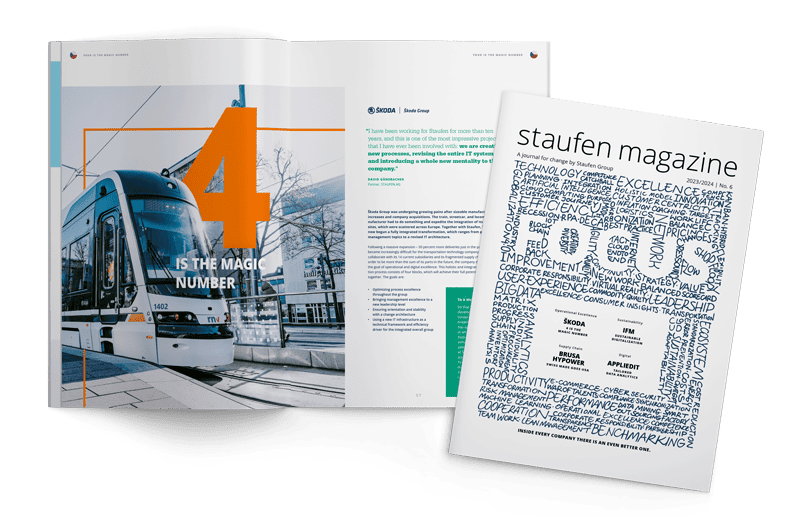
The current Staufen study “Future Industry 2023” underlines how effective lean management is for companies to develop more resilience despite cost pressure. The Binder family company also shows how lean management can not only make you better and faster, but also inspire employees and customers.
For a long time, politicians in particular had hoped that the German economy would get through the multi-crisis without recession. At the end of May of this year, however, it became official: With the economy shrinking for two quarters in a row, it had happened after all. The majority of industrial companies had already anticipated this development and increasingly switched to crisis mode. The current Staufen study “Future Industry 2023”, for which more than 400 industrial companies in the DACH region were surveyed in spring, shows that the goal of more efficient value creation is now even more important than the mega-topic of sustainability.
However, the study also shows that almost all of the companies surveyed (94%) are convinced that lean management is more important than ever and helps to overcome the current challenge. Securing the cost and earnings targets is by far the biggest driver for the use of lean. “Anyone who recognizes that it is not enough to simply make cutbacks can avoid waste and optimize processes through lean value creation. In this way, competitiveness can be sustainably increased in a challenging environment,” says Staufen partner Christian Sprenger.
Higher quality at lower costs
An example of how a company meets the challenges of the market with lean methods is Binder GmbH, the world’s largest specialist for simulation cabinets for scientific and industrial laboratories. More than 22,000 devices leave the Binder factory in Tuttlingen, Germany, every year. Binder’s aim was to ensure competitiveness through shorter development periods because product cycles of simulation cabinets keep on reducing. So, the Lean journey originally started in the development department. “Today, the link with process development in production is the success factor for meeting market requirements,” says Benjamin Jeuthe, Vice President Operations.
Development and production at Binder are now planning a product together right from the start. Benjamin Jeuthe welcomes this very much: “In this way, we always develop production-oriented and save considerable costs at the end of the day.” Restructured processes also help to avoid unnecessary loops. “It is absolutely clear what happens in each individual phase, what the individual work packages look like, who is responsible and who is involved,” explains Peter Wimmer, Vice President Innovation and Products. There are clearly defined regular meetings on the digital shop floor for each project. “In this way, the team can find out about the status of the project and the next tasks within a 10-week plan from anywhere.”
The continuous measurement of progress has ensured transparency across all areas involved. At a glance and thus early on, department heads can see whether a project is still on schedule. Innovation Manager Wimmer: “We have not only succeeded in significantly reducing the development time. Project costs are lower than in former times and the new products are always ready on time and on budget. In addition, our products have reached such a high level of quality that would not have been possible before.”
If the colleagues in the production see that they are not achieving their key figures, for example because the sick leave is too high, the integrated HR expert can then take countermeasures much more quickly.
Benjamin Jeuthe
Vice President Operations
BINDER GmbH
Embed lean competence throughout the organization
As the current Staufen study shows, companies are well aware of these positive effects. However, the degree of lean maturity determines how quickly and efficiently companies can react to new challenges and make forward-looking decisions. And although more than 50 percent of industrial companies now rely on Lean Management in their value creation, there are still major differences here. Staufen partner Sprenger sees the reason for this as follows: “Unfortunately, the terms Lean Management and lean processes are still primarily associated with the production area. The indirect areas in particular also have the potential to make a significant contribution to improving results through operational excellence.”
Up to now, only one in five industrial companies has followed the lean principles in the indirect areas. About half of these lean pioneers are already implementing the lean philosophy strategically and holistically. “A sustainable improvement in corporate performance can only be achieved by anchoring the lean and change competence throughout the organization,” emphasizes Staufen partner Christian Möllers. Eight out of ten companies say that the communication skills of modern executives play a decisive role. But two-thirds also know that this is precisely where their own managers still have the greatest need for training.
Further development of the organization therefore depends, among other things, on the skills of its own managers. A view shared by the two Binder managers. “Lean is also a mentality issue. As a manager, you have to exemplify constant improvement, otherwise you can’t expect the employees to think it’s great,” says Peter Wimmer. “We are always looking at how we can further slim down. Everything with regard to our goal of becoming faster.” Benjamin Jeuthe agrees: “The method used is almost secondary. When it comes to lean management, culture matters. Across all hierarchical levels, everyone must be intrinsically motivated in their daily work, otherwise you will not be successful.”
More customer trust through Lean Management
Although the journey at Binder is far from over, the company is on the right track. Digitization helps Binder with the implementation in the relatively young workforce. For example, the desire to digitize Shop Floor Management came from the departments. “Our department heads actively promote lean. They show us where there are still weak points and encourage us to initiate new projects in which we can work out solutions together,” says operations expert Jeuthe.
In the next few years, the company also wants to introduce Lean Management in the human resources department and in accounting and integrate it into Shop Floor Management. Benjamin Jeuthe explains the advantages: “If the colleagues in the production see that they are not achieving their key figures, for example because the sick leave is too high, the integrated HR expert can then take countermeasures much more quickly.” And what do customers say about lean? “When we take them through the company today and show them how we produce using lean, they suddenly see us with completely different eyes. Lean definitely creates even more trust in our products,” says Peter Wimmer.
Interview partners

Peter Wimmer
Vice President Innovation and Products
BINDER GmbH


Benjamin Jeuthe
Vice President Operations
BINDER GmbH


Christian Möllers
Partner
Staufen AG

Request the English Magazine now as a digital or print version

You might also be interested in

The best strategy? Less, but consistent!
An interview with Max Illies, Vice President Sales at C. Illies & Co. who speaks about Hoshin Kanri and an effective strategy implementation.
Read more
“Don’t hide behind theory, but convince in practice”
The next generation of light commercial vehicles from Mercedes-Benz will also be produced in Düsseldorf. Michael Hellmann, site and production manager of the plant there, explains in an interview why Düsseldorf was awarded the contract.
Read more


